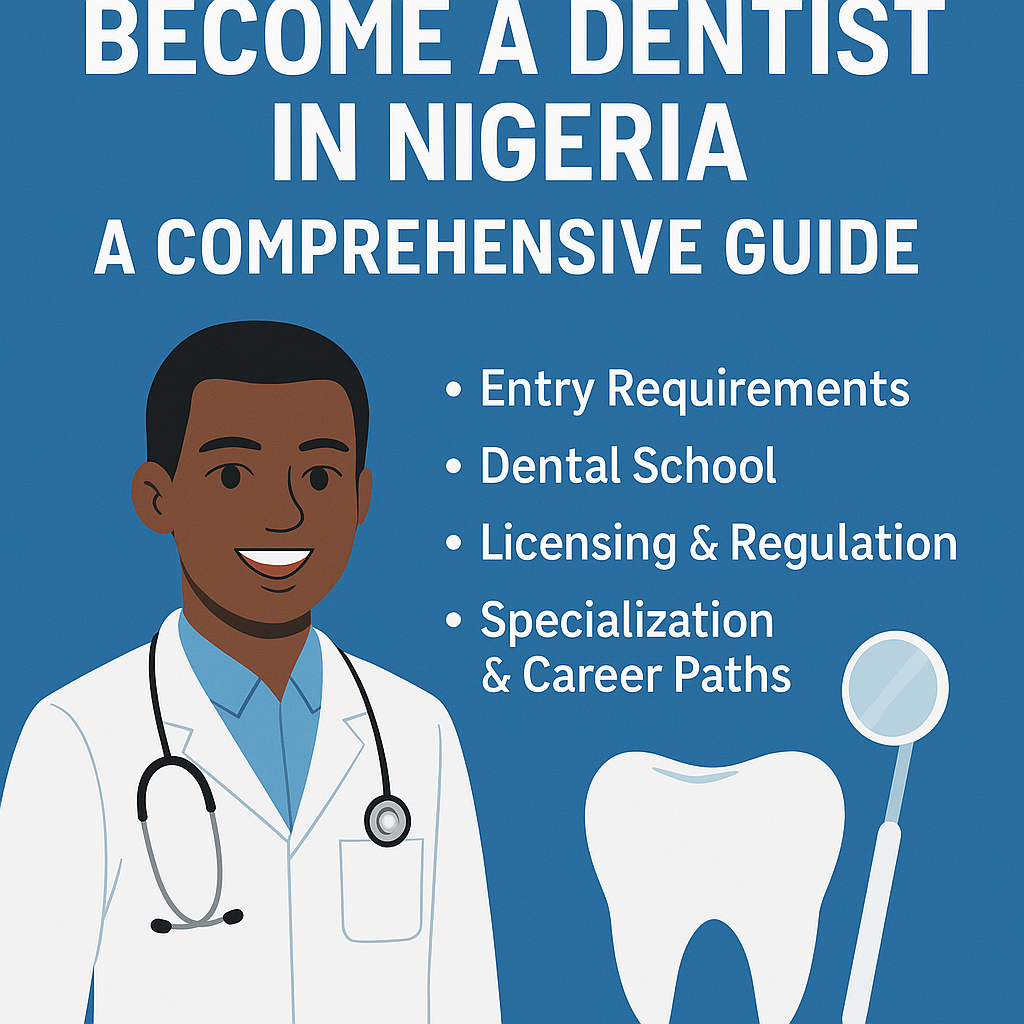Embarking on a career as a dentist in Nigeria is a journey that requires dedication, rigorous study, and commitment to professional standards. If you’re considering this path, this article will walk you through the steps—from entry requirements and study to licensing and career prospects—ensuring you have a clear roadmap to success.
1. Why Choose Dentistry?
Dentistry offers the opportunity to blend science, healthcare, and patient interaction. As a dentist, you’ll diagnose and treat disorders of the teeth, gums, and related oral structures. The role combines technical skill (for procedures), interpersonal skills (communicating with patients), and ongoing professional development. In Nigeria, demand exists for oral health professionals, especially as awareness of dental care continues to rise.
2. Entry Requirements: Secondary School Matters
Before entering a dental programme, you must meet strong secondary school (O‐Level) credentials. Key requirements include:
- Five (5) credit passes in your O’Level (WAEC/NECO) results, in English Language, Mathematics, Biology, Chemistry, and Physics (or similar). MySchoolGist+2Nairaland+2
- For the university entrance exam (UTME) via the Joint Admissions and Matriculation Board (JAMB), you’ll usually need to choose Chemistry, Biology, and one other science subject (often Physics or Mathematics) as your subject combination. MySchoolGist+1
It’s important that you meet these foundational requirements because dental schools are highly competitive.
3. University Admission: Bachelor of Dental Surgery (BDS)
In Nigeria, the standard undergraduate degree for dentists is the Bachelor of Dental Surgery (BDS). Below are the steps and details:
a) Duration
Most universities offer a 5 to 6 year programme for dentistry. For example, at the University of Nigeria, Nsukka, the Faculty of Dentistry uses a six-year duration for typical entrance candidates. University Of Nigeria Nsukka+1
b) Curriculum
The BDS programme will usually start with basic sciences (anatomy, physiology, biochemistry) and progress into clinical dentistry (oral surgery, prosthetics, paediatric dentistry, etc.). For example, at University of Benin, the BDS covers years 100 to 600 levels (i.e., six years) including both pre-clinical and clinical years. WAeUP Kofa
c) Admission Requirements
Beyond the O’Level and UTME subject combination, most dental schools expect very competitive UTME scores, strong academic records, and may include post‐UTME screening. One summary of requirements:
- Five O’Level credits (English, Maths, Physics, Chemistry, Biology). Top Services+1
- For Direct Entry (if you have A-Levels or similar), three A-Level passes in Chemistry, Biology/Zoology and Physics. MySchoolGist+1
- Universities might specify other criteria (e.g., interview, portfolio, co-curricular activities). Nairaland+1
d) Choosing a University
There are several reputable universities in Nigeria offering dentistry programmes. According to ranking sources, top schools include: University of Lagos, University of Ibadan, Obafemi Awolowo University, among others. EduRank
When choosing, consider accreditation status, clinical facility quality, faculty experience, and student support.
4. Clinical Training, Internship & NYSC
After you complete the undergraduate BDS programme, the next steps toward full licensure involve practical training and service.
- Internship (Housemanship): Most dental graduates must complete at least one year of rotating internship in approved hospitals/clinics. This gives you supervised clinical exposure. Nairaland
- National Youth Service Corps (NYSC): In Nigeria, eligible graduates often undertake the one-year NYSC service programme. After that, you may apply for full licensing. Nairaland
- Registration with the Medical and Dental Council of Nigeria (MDCN): The council is the statutory body that regulates dentistry practice in Nigeria. Graduates must register and be licensed to practise. Wikipedia+1
Your progression through these steps ensures you are recognised legally and professionally.
5. Licensing & Regulation
The Medical and Dental Council of Nigeria (MDCN) sets the standards for dental education and practice. Key points:
- The MDCN issues guidelines on registration and licensure of dental practitioners. MDC Nigeria
- For dentists trained abroad, or for certain special cases, the MDCN requires credentials to be verified (via things like the Electronic Portfolio of International Credentials – EPIC) before eligibility. Medical and Dental Council of Nigeria+1
- Graduates must show evidence of qualifications, good character, and meet requirements before full registration. MDC Nigeria+1
It is illegal to practise dentistry in Nigeria without being appropriately registered. The law (Medical and Dental Practitioners Act) enforces this. MDC Nigeria+1
6. Specialization & Career Paths
Once you are a licensed general dental surgeon, you have options to specialise and build a career.
- Specialisations in Nigeria may include oral and maxillofacial surgery, orthodontics, paediatric dentistry, periodontology, prosthodontics, etc.
- To become a specialist (consultant) you typically enrol in a residency/training programme through bodies like the National Postgraduate Medical College of Nigeria (NPMCN) or the West African College of Surgeons (WACS). Nairaland+1
- Career settings include private dental practice, public hospitals, academic dentistry (lecturer), community oral health programmes, and research.
7. Challenges and Considerations
A career in dentistry in Nigeria comes with both opportunities and challenges.
- Competition and high standards: Admission into dental faculties is highly competitive. You must perform very well in secondary school and UTME. Nairaland+1
- Infrastructure and resources: Some dental training hospitals may lack up-to-date equipment and materials, which can impact learning.
- Continuous professional development: Dentistry is evolving (new technologies, materials, techniques). You will need to engage in lifelong learning.
- Regulation compliance: If you studied abroad or your qualification has special status, you may face extra steps like credential verification, exams, etc. Medical and Dental Council of Nigeria+1
- Cost and financial investment: Dental education can be costly in terms of tuition, equipment, materials, and practical exposure.
- Market dynamics: Private practice requires business acumen: managing costs, attracting patients, setting up clinics, and marketing your services.
8. Tips for Aspiring Dentists in Nigeria
Here are practical suggestions to bolster your chances of success:
- Focus early on science subjects (Biology, Chemistry, Physics, Mathematics) in secondary school; aim for high grades.
- Prepare thoroughly for the UTME and post-UTME screening—practise past questions, understand the subject combinations.
- Choose a university with a reputable dentistry faculty, good accreditation status, and strong clinical exposure.
- Engage in extracurricular activities that reflect leadership, communication skills and empathy—dentistry isn’t just technical skill.
- During dental school, build good relationships with supervisors, get hands‐on clinical experience, and stay updated with current dentistry trends.
- After graduation, ensure you complete all required steps promptly (internship, NYSC, registration with MDCN) so you can begin practice without delay.
- If you wish to specialise, plan ahead: understand the requirements for residency, prepare for examinations, and consider research/publications early.
- Think about career goals: Would you prefer work in a public hospital, private practice, or academia? The path you choose will influence your next moves (e.g., setting up a clinic vs joining a hospital).
- Stay ethical and compliant: Registration, licensing, and adherence to professional regulations are non-negotiable in maintaining good standing and reputation.
9. Outlook and Opportunities
Dentistry in Nigeria holds promise:
- Oral health awareness is growing among Nigerians, meaning greater demand for dental professionals and preventive care.
- With proper training, you can open a private dental clinic, join multi-disciplinary health centres, or partner with public health initiatives.
- The ability to specialise offers further opportunity for higher remuneration, leadership roles, and academic appointments.
- Dentists can diversify into related areas such as dental technology (prosthetics), dental hygiene programmes, tele-dentistry, and community oral health education.
10. Summary
Becoming a dentist in Nigeria is a journey that involves:
- Achieving strong secondary school credentials (O’Level credits and UTME requirements)
- Gaining admission into a recognised university dental programme (typically 5–6 years for the BDS)
- Completing practical training (internship, NYSC) and registering with the MDCN
- Beginning practice as a general dental surgeon, and optionally later specialising
- Navigating challenges (competition, resources, regulation) while seizing opportunities (growing demand, private practice, specialisation)
With clear planning, hard work, and persistence, a rewarding career in dentistry is within reach.


